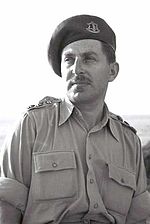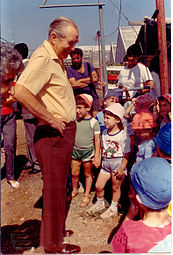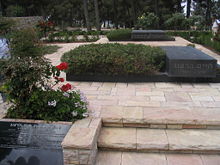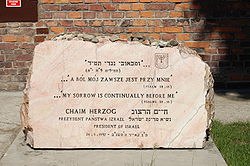- Chaim Herzog
-
Chaim Herzog 
6th President of Israel In office
5 May 1983 – 13 May 1993Prime Minister Menachem Begin
Yitzhak Shamir
Shimon Peres
Yitzhak Shamir
Yitzhak RabinPreceded by Yitzhak Navon Succeeded by Ezer Weizman Personal details Born 17 September 1918
Belfast, Ireland, United KingdomDied 17 April 1997 (aged 78) Nationality Israeli Political party Alignment Spouse(s) Aura Ambache Children 4 Religion Judaism Signature 
Chaim Herzog (Hebrew: חיים הרצוג, 17 September 1918 – 17 April 1997) served as the sixth President of Israel (1983–93), following a distinguished career in both the British Army and the Israel Defense Forces (IDF).
Contents
Biography
Early life
Herzog was born at Clifton Park Avenue in Belfast, the son of notable Rabbi Yitzhak HaLevi Herzog, who was Chief Rabbi of Ireland from 1919 to 1937 (and later, of Palestine and Israel),[1] and Sara (née Hillman).[citation needed] The family home (from 1919) was at 33 Bloomfield Avenue, Portobello in Dublin, Ireland. Herzog studied at Wesley College, Dublin and was involved with the Federation of Zionist Youth during his teenage years.
He immigrated to Palestine in 1935, and served in the Jewish paramilitary group Haganah during the Arab revolt of 1936–39.
He went on to earn a degree in law at University College London, and then qualified as a barrister at Lincoln's Inn.
He joined the British army during World War II, operating primarily in Germany as a tank commander in the Armoured Division.[1] There, he was given his lifelong nickname of "Vivian" because the British could not pronounce the name, "Chaim". A Jewish soldier had volunteered that "Vivian" was the English equivalent of "Chaim." (Living History, p. 47) He was commissioned into the Intelligence Corps in 1943 and participated in the liberation of several concentration camps as well as identifying a captured German soldier as Heinrich Himmler. He left the Army in 1947 with the rank of Major.
Military, legal and political career
Immediately following the war, he returned to Palestine. After the establishment of the State of Israel, he fought in the 1948 Arab-Israeli War, serving as an officer in the battles for Latrun. His intelligence experience during World War II was seen as a valuable asset, and he subsequently became head of the IDF Military Intelligence Branch, a position in which he served from 1948 to 1950 and again from 1959 to 1962. From 1950 to 1954, he served as defense attaché at the Israeli Embassy in the United States. He retired from the IDF in 1962 with the rank of Major-General.
After leaving the army, Herzog opened a private law practice. He returned to public life in 1967, when the Six-Day War broke out, as a military commentator for Kol Israel radio news. Following the capture of the West Bank, he was appointed Military Governor of East Jerusalem, and Judea and Samaria.
In 1972 he went into partnership with Michael Fox and Yaakov Neeman, and established the law firm of Herzog, Fox & Neeman, one of the largest law firms in Israel.[2]
In 1975 Herzog was appointed Israel's Ambassador to the United Nations, in which capacity he served until 1978. During his term the UN adopted the "Zionism is Racism" resolution (General Assembly Resolution 3379), which Herzog condemned and symbolically tore up (as his father had done to one of the British white papers regarding the British Mandate in Palestine), saying: "For us, the Jewish people, this resolution based on hatred, falsehood and arrogance, is devoid of any moral or legal value." In recent years British historians headed by Simon Sebag-Montefiore have included it in a book on speeches that changed the world, which includes others by Luther King, Mandela, Churchill and Kennedy.[3][4]
In the 1981 elections Herzog entered politics for the first time, winning a seat in the Knesset as a member of the Alignment, the predecessor to the Labour Party.
Presidency
On 22 March 1983, Herzog was elected by the Knesset to serve as the sixth President of Israel, by a vote of 61 to 57, against Menachem Elon, the candidate of the right and the government coalition. He assumed office on 5 May 1983 and served two five-year terms (then the maximum permitted by Israeli basic law), retiring from political life in 1993. As president of Israel, Herzog made a number of visits abroad, being the first Israeli president to make an official visit to Germany, as well as visiting several far-east countries, Australia, and New Zealand. He was also noted for pardoning the Shin Bet agent involved in the Kav 300 affair.
In 1985 Herzog visited Wesley College Dublin during his State Visit to Ireland, during which he opened the Irish Jewish Museum in Dublin, Republic of Ireland. While on his visit to Ireland, he also unveiled in Sneem Culture Park, Co Kerry, a modern polished steel Israeli sculpture, in honour of his childhood friend, Cearbhall Ó Dálaigh, the fifth President of Ireland.
Herzog was a hardened opponent of Saddam Hussein regime in Iraq during his presidency of Israel, he referred to Iraq as a nest "of world terror". He said the world largely dismissed Israel's warnings that Baghdad was becoming a capital of world terrorism, adding that some Western countries helped Hussein develop into a military power.[5]
Herzog died on 17 April 1997, and is buried on Mount Herzl, Jerusalem.
Herzog controversially reduced the sentences of three imprisoned Jews, Menachem Livni, Uzi Sharbaf and Shaul Nir, members of the Jewish Underground, who were sentenced to life imprisonment in 1985 for the 1984 murder of four Palestinians in the West Bank town of Hebron. Herzog had reduced the sentences, first to 24 years, then to 15 years, and in 1989 he reduced the sentence to 10 years, which enabled the men to be released two years later on good behavior.[6][7]
Herzog was the brother-in-law of Abba Eban; the men's wives were sisters. He had three children, including Isaac Herzog, former (2006–2011) Minister of Social Affairs, Minister of the Diaspora, and a Knesset Member for the Labor Party.
In 2005, he was voted the 115th-greatest Israeli of all time, in a poll by the Israeli news website Ynet to determine whom the general public considered the 200 Greatest Israelis.[8]
Published works
Herzog also authored several books on the historical events in which he was involved, including:
- Herzog, Chaim (1978). Who stands accused?: Israel answers its critics. Random House. ISBN 0394501322.
- Herzog, Chaim (12 December 1983). The Arab-Israeli Wars: War and Peace in the Middle East from the War of Independence through Lebanon. Vintage. ISBN 0394717465.
- Herzog, Chaim (September 1989). Heroes of Israel: Profiles of Jewish Courage. Little Brown and Company. ISBN 0316359017.
- Herzog, Chaim (12 November 1996). Living History: A Memoir. Pantheon. ISBN 067943478X.
- Herzog, Chaim; Mordecai Gichon (March 1997). Battles of the Bible. Pantheon. ISBN 1853672661.
- Herzog, Chaim (March 1998). The War of Atonement. Greenhill Books. ISBN 0394717465.
References
- ^ a b "Herzog, Chaim (1918–1997)". Israel and Zionism. The Department for Jewish Zionist Education. http://www.jafi.org.il/education/100/people/BIOS/herzog.html. Retrieved 5 November 2007.
- ^ BDI: Herzog, Fox & Neeman remains top Israeli law firm Step Strategy, 26 June 2006
- ^ Herzog speech on Zionism makes history, Ynet news. Ynet.co.il (10 November 1975). Retrieved on 9 September 2011.
- ^ Ten of the greatest: Inspirational speeches, Mailonline, Colonel Tim Collins. Dailymail.co.uk. Retrieved on 9 September 2011.
- ^ Herzog Calls Iraq a Nest of Terrorism, Los Angeles Times, 19 November 1990|Steve Padillaa and Ronald L. Soble. Los Angeles Times. (19 November 1990). Retrieved on 9 September 2011.
- ^ 3 Israeli Terrorists Are Released In 4th Reduction of Their Terms New York Times, 27 December 1990
- ^ Documents given to Arabs in Gaza New York Times, 7 June 1989
- ^ גיא בניוביץ' (20 June 1995). "הישראלי מספר 1: יצחק רבין – תרבות ובידור". Ynet. http://www.ynet.co.il/articles/0,7340,L-3083171,00.html. Retrieved 10 July 2011.
External links
- Chaim Herzog Jewish Virtual Library
- Chaim Herzog Jewish Agency for Israel
- Israel, Jewish world mourn death of Chaim Herzog, 78 Jewish News Weekly
- Chaim Herzog Knesset website
- The First Israeli President to visit the White house The New York Times
Diplomatic posts Preceded by
Yosef TekoaIsraeli Ambassador to the UN
1975–1978Succeeded by
Yehuda BlumHeads of the Israeli Military Intelligence Directorate  Be'eri (1948–49) · Herzog (1949-50) · Gibli (1950-55) · Harkabi (1955–59) · Herzog (1959–62) · Amit (1962–63) · Yariv (1964–72) · Zeira (1972–74) · Gazit (1974–78) · Saguy (1979-83) · Barak (1983-85) · Lipkin-Shahak (1986-91) · Sagi (1991–95) · Ya'alon (1995–98) · Malka (1998–2002) · Ze'evi-Farkash (2002–06) · Yadlin (2006-2010) · Kochavi (2010-)
Be'eri (1948–49) · Herzog (1949-50) · Gibli (1950-55) · Harkabi (1955–59) · Herzog (1959–62) · Amit (1962–63) · Yariv (1964–72) · Zeira (1972–74) · Gazit (1974–78) · Saguy (1979-83) · Barak (1983-85) · Lipkin-Shahak (1986-91) · Sagi (1991–95) · Ya'alon (1995–98) · Malka (1998–2002) · Ze'evi-Farkash (2002–06) · Yadlin (2006-2010) · Kochavi (2010-)
Heads of Southern Command  Allon (1948–49) · Rabin (1949) · Dayan (1949–51) · Tzadok (1951–54) · Peri (1954) · Amit (1955–56) · Simhoni (1956) · Laskov (1956–58) · Herzog (1958) · Yoffe (1958–62) · Zamir (1962–64) · Gavish (1965-69) · Sharon (1969-73) · Gonen (1973) · Bar-Lev (1973) · Tal (1973-74) · Adan (1974) · Adam (1974–76) · Shapir (1976–78) · Shomron (1978–82) · Erez (1982–83) · Bar Kokhva (1983–86) · Sagi (1986) · Mordechai (1986–89) · Vilnai (1989–94) · Mofaz (1994–96) · Yanai (1996–97) · Samia (1997–2000) · Almog (2000–03) · Harel (2003–05) · Galant (2005–2010) · Russo (2010–)
Allon (1948–49) · Rabin (1949) · Dayan (1949–51) · Tzadok (1951–54) · Peri (1954) · Amit (1955–56) · Simhoni (1956) · Laskov (1956–58) · Herzog (1958) · Yoffe (1958–62) · Zamir (1962–64) · Gavish (1965-69) · Sharon (1969-73) · Gonen (1973) · Bar-Lev (1973) · Tal (1973-74) · Adan (1974) · Adam (1974–76) · Shapir (1976–78) · Shomron (1978–82) · Erez (1982–83) · Bar Kokhva (1983–86) · Sagi (1986) · Mordechai (1986–89) · Vilnai (1989–94) · Mofaz (1994–96) · Yanai (1996–97) · Samia (1997–2000) · Almog (2000–03) · Harel (2003–05) · Galant (2005–2010) · Russo (2010–)
Heads of State of Israel 

Chairmen of
Provisional State CouncilDavid Ben-Gurion (1948) • Chaim Weizmann (1948 – 1949)Presidents Chaim Weizmann (1949 – 1952) • Yitzhak Ben-Zvi (1952 – 1963) • Zalman Shazar (1963 – 1973) • Ephraim Katzir (1973 – 1978) • Yitzhak Navon (1978 – 1983) • Chaim Herzog (1983 – 1993) • Ezer Weizman (1993 – 2000) • Moshe Katsav (2000 – 2007) • Shimon Peres (2007 – present)Categories:- 1918 births
- 1997 deaths
- People from Belfast
- Jews from Northern Ireland
- British Army soldiers
- Intelligence Corps officers
- Israeli diplomats
- Israeli generals
- Israeli Jews
- Irish Jews
- Irish emigrants to Israel
- People from Dublin (city)
- Presidents of Israel
- Irish diaspora politicians
- Members of the Knesset
- Alumni of University College London
- Permanent Representatives of Israel to the United Nations
- Herzog family
- Alignment (political party) politicians
- Burials at Mount Herzl
- People educated at Wesley College, Dublin
Wikimedia Foundation. 2010.






